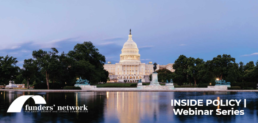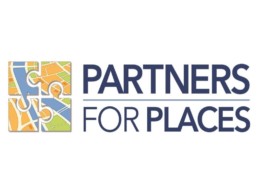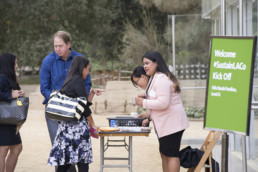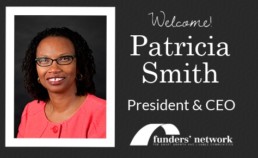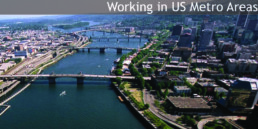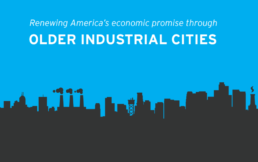Inside Policy Series: What funders need to know about federal policy
By: TFN StaffKeeping abreast of federal policy can be daunting — especially given the daily churn of a 24/7 news cycle and rapidly shifting Washington landscape. Join us for the second installment of our Inside Policy briefings that explore emerging policy trends and their potential impacts on people and communities. Topics include the state of fair housing, whether tax incentives for low-income neighborhoods can create equitable development, and the increasingly important role states are playing in challenging federal policy. Register today for one or all of our three-part series — and be sure to check out our TFN calendar of events for other learning opportunities. |
 |
Fair Housing in a Shifting Federal EnvironmentJune 25 | 1-2 p.m. ET |
|
|
As federal policy direction shifts, the federal commitment to fair housing is under intense pressure with high-stakes impact on both people and places. Growing distance between anti-discrimination goals, federal priorities and regulatory guidance worries advocates of equity and inclusion. Join this session to hear from a leading national fair housing voice about the status of fair housing, how communities are responding and how funders can rethink both the opportunities and challenges that lie ahead. SpeakersLisa Rice, President and CEO, National Fair Housing Alliance Register for this webinar here. |
 |
Can Opportunity Zones Create Equitable Impact?July 23 | 3-4 p.m. ET |
|
|
Created as part of the Trump Administration's Tax Cuts and Jobs Act, Opportunity Zones are a new federal economic development tool aiming to improve the outcomes of distressed communities around the country. But how can advocates and stakeholders harness its power and ensure positive impact on equitable, community-based neighborhood restoration? Join this session to learn more about the Opportunity Zones program, its potential as a development tool and the roles funders can play in emerging local implementation. SpeakersKatie Kramer, Vice President, Council of Development Finance Agencies Register for this webinar here. |
 |
Balance of Power: How Courts and States are Impacting PolicySept. 24 | 1-2 p.m. ET |
States and the courts have emerged as high-profile players amid swiftly changing federal policy, stepping in with key actions related to immigration, climate change, civil liberties and other areas. Whether they question or affirm, impede or support proposed federal policy decisions, State’s Attorneys General are a significant element. Join this session to hear from James E. Tierney, the former attorney general of Maine, learn more about the role of states and the courts in the current federal agenda, and explore the consequent impact on inclusive growth, sustainability, and equitable government systems. SpeakersJames E. Tierney, Director, StateAG.org, and Lecturer, Harvard Law School Register for this webinar here. |
 |
|
The Inside Policy series is intended for a funder-only audience. Registrants will receive a link to the webinar via email in advance of the briefing session. |
New grant opportunity for sustainability efforts : Partners for Places' latest RFP released!
By Ann Fowler Wallace, TFN Director of ProgramsIn partnership with the Urban Sustainability Directors Network, the Funders' Network for Smart Growth and Livable Communities (TFN) is pleased to announce the opening of Round 13 of the Partners for Places grant program. Partners for Places is a successful matching grant program that improves U.S. and Canadian communities by building partnerships between local government sustainability leaders and place-based foundations. National funders invest in local projects developed through these partnerships to promote a healthy environment, a strong economy and well-being for all residents. Through these investments, Partners for Places fosters long-term relationships that make our communities more prosperous, livable and vibrant. In addition to the general grant program, Round 13 also includes dedicated funding to support green stormwater infrastructure projects that advance water-related sustainability goals. The grant program provides partnership investments between $25,000 and $75,000 for one year projects, or $50,000 and $150,000 for two year projects, with a 1:1 match required by one or more local foundations. To date, Partners for Places has awarded nearly $6 million across North America in this successful matching grant program, leading to nearly $12 million in investments. |
Creating a Successful ProposalPartners for Places now accepts proposals for the creation of a community-focused sustainability, climate action, adaptation/resilience, or comprehensive plan that specifically addresses sustainability or addresses an area identified for performance improvement or implementation for Certified STAR Communities. If your proposal requests funding for the creation of one of these plans, please closely review our Planning Process Guide linked here before preparing your proposal. In addition, all proposals are scored on the extent to which projects include meaningful involvement of priority audiences/stakeholders in program development and implementation. To review our guidance document on meaningful engagement, click here. The application deadline for Round 13 is July 31, 2018 (by 11:59 p.m., any time zone). Please visit the Partners for Places webpage for more information. Here you can view our promotional video, download the Request for Proposals (RFP), and access our Proposal Form and Budget Form. You may also consult our Frequently Asked Questions (FAQ) for Round 13 document. |
Additional ResourcesInfo WebinarsTFN and USDN will host a series of Partners for Places Round 13 Info Webinars. (Partners for Places will also be featured in our June TFN Learning Network Webinar.) Please visit here for the full schedule of upcoming learning opportunities. In the NewsPartners for Places was the subject of a recent feature by Inside Philanthropy: The Latest Push for Cities That Are Both More Sustainable and Equitable. |
Funder InvestorsPartners for Places general grant program is supported by The JPB Foundation, Kendeda Fund, New York Community Trust, The Summit Foundation, and Surdna Foundation. Support for the dedicated stormwater matching grant funding is provided by The JPB Foundation,The Kresge Foundation and the Pisces Foundation. Selection ProcessA selection committee comprised of foundation representatives and urban sustainability directors makes grant selection decisions on behalf of Partners for Places. Awards will be announced on Nov. 8, 2018. Any Questions?If the RFP and FAQ documents don’t answer all your questions, please contact Ashley Quintana at ashley@www.fundersnetwork.orgor Ann Wallace at ann@www.fundersnetwork.org for more information. |
What can this once-thriving mill town teach us about sustainability? Join our deep-dive on Biddeford, Maine, at NEFN's annual meeting
By: TFN Staff
Are you a funder working in the Northeast — and looking to build relationships with other foundations, local partners and others working in the same area?
TFN’s Northeast Funders’ Network will hold its annual meeting, in partnership with the Orton Family Foundation, during a two-day event that will span two Maine cities June 18-19: Biddeford and Kennebunkport.
Join us as we delve into a range of topics of keen interest to Northeast funders, deepen learning from place and share best practices and strategies with peers. The meeting will focus on innovation and key trends affecting small towns, rural communities and older legacy cities.
The meeting kicks off Monday, June 18, at the Pepperell Mill Complex in Biddeford, where we’ll hear a powerful story of how civic leaders, residents, business interests and local institutions are coming together to pursue a more sustainable and vibrant future for this once-thriving mill town. Biddeford is making a transition from dependence on a single waste-to-energy incinerator toward a future built on diverse and robust smaller ventures.
In 2012, the Biddeford’s leaders decided to buy the waste facility for $ 6.5 million and close it, losing 80 jobs as well as the largest contributor to the city’s tax base. Since then, more than 90 new businesses have moved into the redeveloped Pepperell Mill complex creating 500 jobs, with the space is only half built out. Today, Biddeford has a growing economy and stable, stronger tax base. But revitalization has brought new worries about gentrification and other issues.
During a deep-dive session moderated by Gabrielle Smith, senior associate for strategic partnerships at the Orton Family Foundation, we’ll hear from Biddeford Mayor Alan Casavant and others about how Biddeford is taking steps to address these challenges.
Our first day will also include a walking tour of Downtown Biddeford with Delilah Poupore, executive director of Heart of Biddeford, and Pete Lamontagne, head tour guide at the Biddeford Mills Museum.
Our second day of the NEFN meeting will take us to nearby Kennebunkport, where we’ll explore clean energy opportunities in the region, innovations in rural development and the potential of investing in local media.
Take a look at our agenda highlights below, or view full agenda and list of speakers here. For registration information on the NEFN Annual Meeting visit us here.
Agenda OverviewMonday, June 18 2:00-4:00 p.m. | NEFN Meeting at Pepperell Mill Campus Speakers: · Gabrielle Smith, Senior Associate for Strategic Partnerships, Orton Family Foundation (Moderator) · Alan Casavant, Mayor, Biddeford · Tammy Ackerman, Executive Director, Engine & Program Director, Maine FabLab · Delilah Poupore, Executive Director, Heart of Biddeford · James Bennett, City Manager · Doug Sanford, Developer · Mathew Eddy, Economic Development Director 4:00-5:30 p.m. | Walking Tour of Downtown Biddeford Joining us on the tour: · Pete Lamontagne , Head Tour Guide, Biddeford Mills Museum · Delilah Poupore, Executive Director, Heart of Biddeford 6:30 p.m. | Networking Reception and Dinner Tuesday, June 19 8:30 a.m. to 3:00 p.m. | NEFN Meeting at Colony Hotel, Kennebunkport • Advancing Clean Energy Opportunities in the Region Speakers: · Meredith Hatfield, Climate Program Officer, Barr Foundation (Moderator) · Christine Donovan, Vermont Energy Investment Corp, Brooks Winner, Island Institute, Maine · Jared Duval, Energy Action Network (EAN), Vermont • Rural Development Innovations in the Northeast and Beyond Speaker: · Rob Riley, President, Northern Forest Center • The Potential of Investing in Local Media Speakers: · Gaye Symington, High Meadows Fund (Moderator) · Daniel Dinsmore, Executive Director, Maine Center for Public Interest Reporting · Anne Galloway, founder and Editor of Vermont Digger · Mark Simpson, News Director, Maine Public Radio |
A "gas tax" repeal effort threatens funding for sustainable transportation in California
By Kerry Gallagher and Marta Lindsey, Smart Growth California
More than 800,000 signatures have been gathered to place a repeal of SB 1 – also known as the “gas tax” – on California’s November ballot this year.
Given the repeal efforts, we want to lift up this major transportation infrastructure bill and what it means for California’s communities.
Last October, Smart Growth California hosted a webinar for funders to learn about SB 1, which passed in April 2017. SB 1 raises $5.4 billion per year for the state’s transportation construction and repair budget through increases in the gas tax and vehicle fees. A 12 cent-per-gallon hike in the gasoline tax went into effect on November 1; other taxes on diesel fuel and vehicles are yet to be implemented.
On our webinar, advocates from ClimatePlan, the California Bicycle Coalition, and PolicyLink discussed their joint efforts to shape SB 1 to meet transportation justice and sustainable transportation goals. The coalition ultimately succeeded in several significant and hard-fought wins within SB 1:
- A tripling of the state’s investment in public transportation;
- A near doubling of monies for the Active Transportation Program; and
- Support for planning for sustainable communities as well as workforce development.
SB 1 is hardly perfect; the coalition raised concerns about the bill, such as the “dirty-diesel” amendment added last-minute to allow diesel truck pollution to continue. Other concerns included the disproportionate focus of funding on automobile transportation and the lack of targeted investment in California’s most vulnerable communities. But even in its imperfect state, SB 1 raises a groundbreaking $8.5 billion for sustainable transportation.
Read more about SB 1 and the impact of its potential repeal on the Smart Growth California blog.
(Photo credit: Getty Images)
What makes a successful Partners for Places proposal? Register for our Partners for Places Info Webinars
By TFN StaffWe recently announced the latest round of grantees for the Partners for Places matching grant program. (You can read more about the six cities chosen on our blog, or in this great write-up recently featured in Inside Philanthropy.) More good news for cities and funders looking hoping to support sustainability projects that promote a healthy environment, a strong economy and well-being for all residents: the Request for Proposals for the next round of Partners for Places grants will go live June 5, 2018. (The deadline to apply is July 31, 2018.) Want to learn more about how you can propose a local sustainability project that builds on vital partnerships and improves communities across the U.S. and Canada? Be sure to register for our upcoming Partners for Places Info Webinars below. |
 |
Round 13 Info WebinarIn Partnership with the Canadian Environmental Grantmakers' Network and the Community Foundations of CanadaMay 23, 2018 Hear from a Community Foundations of Canada representative and new grantees in Edmonton, Alberta, who recently received a Partners for Places grant for an effort to work with low-income, immigrant and indigenous communities to ensure they are meaningfully engaged in energy transition programs focused on a low-carbon, sustainable energy future. Speakers |
 |
Round 13 Info WebinarJune 14, 2018 Join us to learn more about submitting a successful proposal for Round 13 of the Partners for Places matching grant program. This webinar will give potential applicants an opportunity to hear more about the new Request for Proposal, to be released June 5. We'll have staff from TFN and USDN on hand to offer insight and field your questions. |
 |
Round 13 Info WebinarWith Green Infrastructure Leadership ExchangeJune 15, 2018 In addition to the existing sustainability priority areas, Round 13 includes dedicated funding to support green stormwater infrastructure projects that advance water-related sustainability goals. This webinar will focus on how to submit proposals for green stormwater infrastructure projects, highlighting the importance of collaboration between sustainability directors and water utility/water department personnel. The Green Infrastructure Leadership Exchange, a new practitioner network supporting green infrastructure communities, is a new partner to USDN and TFN for the green stormwater infrastructure projects. |
 |
About Partners for PlacesA joint project of TFN and the Urban Sustainability Directors Network, Partners for Places is a successful matching grant program that improves U.S. and Canadian communities by building partnerships between local government sustainability leaders and place-based foundations. National funders invest in local projects developed through these partnerships to promote a healthy environment, a strong economy and well-being for all residents. Through these investments, Partners for Places fosters long-term relationships that make our communities more prosperous, livable and vibrant. The general grant program is supported by five investor foundations: The JPB Foundation, The Kendeda Fund, The New York Community Trust, The Summit Foundation, and Surdna Foundation. To date, Partners for Places has awarded nearly $6 million across North America in this successful matching grant program, leading to nearly $12 million in investments. For more information on Partners for Places, visit us here, or reach out to Ann Fowler Wallace or Ashley Quintana. |
What do these six cities have in common? They're the newest Partners for Places grantees!
By Ann Fowler Wallace, TFN Director of ProgramsNow, more than ever, communities are coming together to confront climate change and build resilience at the local level. That's why we're excited to announce the newest round of Partners for Places grantees: six cities across the United States and Canada that will receive nearly $900,000 dollars for sustainability efforts. These local sustainability efforts focus largely on empowering and engaging low-income neighborhoods — communities that are disproportionately affected by climate change and extreme weather. They will take place in cities both large and small, from a project in Indianapolis, Ind., that will recruit neighborhood “resilience ambassadors” to a solar-power effort in Oak Park, Ill., where local teens will research and produce a climate-themed radio show. Three of the communities occupy especially vulnerable waterfront geographies: Honolulu, Los Angeles and Miami are embarking on efforts to either craft or refine resiliency plans and strategies. And in Edmonton, Canada, Partners for Places will help fund efforts to include low-income, immigrant and indigenous communities in plans to move to a low-carbon future. |
Vision and Vital Partnerships |
Partners for Places, led by TFN in partnership with the Urban Sustainability Directors Network, pairs city governments with philanthropy to support sustainability projects that promote a healthy environment, a strong economy and well-being for all residents. “Communities across this country are already tackling the threat of climate change with passion and purpose,” said Arturo Garcia-Costas, environmental program officer for the New York Community Trust. “These projects showcase their ingenuity and vision, and exemplify how philanthropy can support the vital partnerships we need to create safer, stronger and more resilient communities.” Partners for Places will provide $443,344 in funding to these six cities through its general grant program, which will be matched by local funders. That means a total of $899,977 will be leveraged to fund sustainability projects in these selected cities. The program is supported by five investor foundations: The JPB Foundation, The Kendeda Fund, The New York Community Trust, The Summit Foundation, and Surdna Foundation. To date, Partners for Places has awarded nearly $6 million across North America in this successful matching grant program, leading to nearly $12 million in investments. |
Meet the New Grantees |
|
The latest Partners for Places grant recipients and their matching funders are: • Edmonton, Canada ($59,883): To work with low-income, immigrant and indigenous communities to ensure they are consulted and included in energy transition programs focused on a low-carbon, energy sustainable future. (Matching funder: Edmonton Community Foundation.) |
• Honolulu, Hawaii ($75,000): To create a clear, ambitious, achievable climate action and adaptation plan that addresses unique cost of living and climate impact vulnerabilities of Oahu — the island that is home to the state’s capital city of Honolulu — and serves as a model for climate planning throughout the Hawaiian Islands. (Matching funder: Hawaii Community Foundation.) • Indianapolis, Ind. ($146,711): To create a comprehensive, equitable, and socially just sustainability, climate action, and resilience plan for Indianapolis, with actions initially implemented within revitalization-focused neighborhoods. (Matching funders: McKinney Green Initiatives, a Central Indiana Community Foundation fund, and Indianapolis Power & Light.) • Los Angeles County, Calif. ($87,500): To actively include community voices in a countywide sustainability plan by employing innovative engagement strategies and building meaningful community partnerships — including working with low-income communities and communities of color that are often the most vulnerable to climate change, urban heat island impacts, and poor air quality. (Matching funders: Conrad N. Hilton Foundation and LA n Sync at the California Community Foundation.) |
• Miami, Fla.($25,000): To develop a resilience strategy that is integrated with the city’s strategic plan and land-use policies, with a strong focus on engaging low-income and underserved communities. This includes a community engagement consultant that will assist in workshops to uncover the best and most innovative ideas for increasing resilience in these communities — and the city as a whole. (Matching funder: The Miami Foundation.) • Oak Park, Ill. ($49,250): To drive continued action, education and outreach on solar development and procurement in Oak Park, River Forest and surrounding communities, including a local radio show produced by teens, and influencing and inspiring similar efforts in other Chicago metro area counties and communities. (Matching funder: The Community_works_ Fund of the Oak Park River Forest Community Foundation.) |
New RFP Coming Soon!Partners for Places will open a new round of funding for the general grant program in early summer. The Round 13 RFP will be released on June 5, 2018, and proposals will be due on July 31, 2018. For more information about the Partners for Places program, please feel free to reach out to TFN's Director of Programs Ann Fowler Wallace. |
15 Years of Disaster Recovery: A Community Foundation’s Journey
By Louise Knauer, Chief Operating Officer for the Community Foundation of the Ozarks
This week, TFN's Philanthropic Preparedness, Resiliency and Emergency Partnership (PPREP) convened in Springfield, Mo., to explore the intersections of land-use decisions, community resilience and equitable disaster preparation and recovery. Our meeting was hosted by the amazing team at the Community Foundation of the Ozarks, a member of our PPREP cohort. Here, CFO's Chief Operating Officer Louise Knauer offers her insights on a post originally shared via the Center for Disaster Philanthropy.
Fifteen years ago, the Community Foundation of the Ozarks (CFO) started its first disaster response when a high-end F3 tornado killed three and destroyed much of downtown Stockton, Mo., a county seat with a lovely sailing lake. It’s an easy date to remember – 05/04/03.
At the time, the Stockton Community Foundation was a year-old member of the CFO’s affiliate network. Its president, Brian Hammons, third-generation leader of his family’s black-walnut business, wasn’t sure exactly how the CFO could help, but he was sure he needed to muster all the help he could find.

Neither I nor current CFO President, Brian Fogle, worked at the Foundation in 2003. I was the spokesperson for the City of Springfield, Mo., where the CFO is based. Brian was a community development banker for Great Southern Bank, which had a couple of walls and two vaults left standing at its Stockton branch. Then-CFO President Dr. Gary Funk tapped us, among others, to figure out how the CFO could support Stockton’s recovery.
My city colleagues found our niche helping the community focus on recovery priorities through engagement activities. Gary and Brian worked with the Hammons family to establish a charitable fund to encourage an intentional planning process and also a community development corporation to offer gap financing to help businesses rebuild.
Our methods seem so quaint today – we tacked up flyers and hauled flip charts and paper surveys to community meetings – no social media, no Survey Monkey, maybe a PowerPoint. Gary, Brian, and Brian and Dwain Hammons sketched out the CDC’s framework on paper napkins.
The contrast seems especially striking this week, 15 years and multiple natural disasters later. Today, the CFO is part of the Funders’ Network for Smart Growth and Livable Communities' Philanthropic Preparedness Resiliency and Emergency Partnership (PPREP), a cohort of Midwestern community foundations and regional grantmaking associations. The Center for Disaster Philanthropy serves as the curriculum development and technical assistance partner for the program. The cohort met in Springfield this week for topical learning about mission-related investing, adaptive land use, mitigation strategies and civic architectural design within the context of natural disaster recovery.
Our training marries very real experience and insight from natural disasters within our cohort’s 18 regions with knowledge from experts in planning, nonprofit, government, natural resource and related fields.
Last year, the CFO experienced another disaster first – massive spring flooding on the national scenic rivers in south-central Missouri that washed out towns and the river-related economic base that sustains one of the nation’s poorest regions. It was a classic low-attention disaster in a sparsely populated area; we opened traditional recovery funds, but knew we needed to do more.
Read the full post on the Center for Disaster Philanthropy blog here.
About The Author
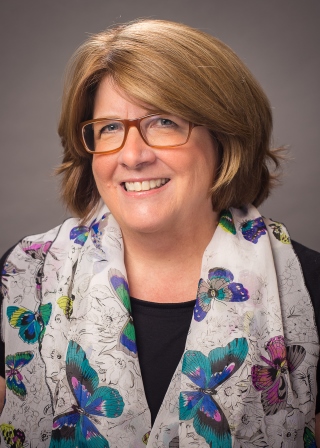
Louise Knauer is the Chief Operating Officer for the Community Foundation of the Ozarks. She can be reached at lknauer@cfozarks.org.
New President & CEO of TFN announced: Patricia Smith of the Reinvestment Fund brings decades of innovative, collaborative leadership experience
By Tom Woiwode, Chairperson, Funders' Network Board of Directors
For the past several months, our executive search committee has undertaken an exciting yet formidable task: determining who will lead this robust, thriving network of passionate funders and dedicated staff as we move toward the future.
We are delighted to announce today that Patricia Smith, a senior policy advisor at the Reinvestment Fund with decades of leadership experience in the philanthropic, government and nonprofit sectors, will be the new president and CEO of the Funders’ Network for Smart Growth and Livable Communities (TFN).
Patricia comes to TFN with an impressive background in developing and implementing policy, programs and strategies that have engaged funders and mobilized diverse coalitions to help create more prosperous and livable communities.
Above all, she is an innovative, enthusiastic and effective problem-solver and team-builder who appreciates the important role TFN plays in supporting and connecting a network of more than 170 community, regional and national foundations across the U.S. and Canada, in addition to our successful Partners for Placesmatching grants program and PLACES Fellowship.
Building on a Strong Foundation
“I’m thrilled at the opportunity to work with such a dynamic team and lead an organization with such a stellar reputation,” said Patricia. “This is a network built on dedicated, highly engaged funders with the support of an exemplary TFN team. As the network approaches its 20th anniversary, we can build on this impressive foundation and truly become a hub of innovation and collaboration exploring the important intersections between equity work, environmental sustainability and inclusive economic development.”
She is currently senior policy advisor at the Reinvestment Fund, a national leader working to rebuild economically-distressed communities through the innovative use of capital, data and partnerships. Patricia has led the Reinvestment Fund’s efforts to improve access to healthier foods in underserved urban and rural communities and is a well-regarded advisor on healthy food financing programs across the country. Patricia was instrumental in launching the Healthy Food Financing Initiative (HFFI) to increase awareness about inequitable access to healthy foods and the need for federal action. (To date, the initiative has yielded more than $243 million in federal grants and encouraged the establishment of similar financing programs in a dozen states and cities.)
A Focus on Collaboration
Patricia, who joined the Reinvestment Fund in 2005 as director of special initiatives, has managed several collaborative projects: William Penn Foundation Targeted Neighborhoods Initiative; Ford Foundation Camden Regional Demonstration Project; and Rockefeller Foundation Creativity and Neighborhood Development Project. Prior to joining the Reinvestment Fund, Patricia directed Philadelphia’s Neighborhood Transformation Initiative (NTI), a $295 million public-private partnership that sought to address decades of urban blight and stimulate new investment in the city’s neighborhoods.
Among her other professional achievements: She launched the Human Capital Development Initiative, an $8 million national leadership development and grantmaking program funded by the National Community Development Initiative (now known as Living Cities); worked extensively with community development corporations as a program manager with The Philadelphia Foundation; and supervised the Philadelphia Redevelopment Authority’s housing division as a deputy executive director.
She began her career in the field of law, serving as legal counsel to grassroots organizations and litigating housing and consumer rights cases as a Community Legal Services attorney, and later served as a deputy chief of staff attorney for the Philadelphia City Council.
A native of Philadelphia, Patricia — who prefers to be called Pat — holds a bachelor’s degree from Mount Holyoke College, a juris doctorate from George Washington University Law Center, and was a 2002 Fannie Mae Foundation Fellow. She sits on the Board of Directors of the Pennsylvania Horticultural Society and was appointed by the president of the Philadelphia City Council to serve as his representative on the Philadelphia Museum of Art Board of Trustees.
She has authored or contributed to many publications and scholarly works, and in 2006 appeared in the PBS documentary Edens Lost and Found: How Ordinary Citizens Are Restoring Our Great American Cities.
Looking to the Future
Patricia will officially join TFN on July 2, although she will be working closely with Interim President and CEO Maureen Lawless and the rest of the leadership team to ensure a smooth transition. Maureen will then resume her duties as vice president and director of member services full time. I’d like to thank Maureen and the rest of the TFN team of directors, program associates and contractors for their hard work and dedication over the past several months. I also want to acknowledge appreciation not only for the members of the executive search committee, but the many individuals who expressed an interest in this position. We vetted nearly a hundred qualified applicants, a testament to the high regard professionals within the field of philanthropy and other sectors hold TFN.
Patricia will commute for the time-being between her hometown, where she lives with her partner, Elbert Sampson, and TFN’s headquarters in Miami. (We suspect she will have good reason to feel at home in her new city, which faces Biscayne Bay: The couple are avid sailors and proud owners of a 1967 Alberg 35 sailboat, Pearl, named after Pat’s maternal grandmother and Elbert’s paternal grandmother.)
On behalf of the TFN community, I hope you’ll join me in wishing Pat a warm welcome as she takes on this key role at such a pivotal and promising time in the network’s history.
About the Author
Chairperson, TFN Board of Directors
Tom Woiwode was elected in March as the chairperson of the Funders' Network Board of Directors. He is a director at the Community Foundation for Southeast Michigan, where among his duties he oversees the GreenWays Initiative.
Curing the rural-urban divide
By Peter Pollock, Lincoln Land Institute of Land Policy and Michael Wetter, Intertwine Alliance
As part of our Learning Network Webinar, Greenspace Conservation in Metropolitan America: Partnerships That Benefit People and Nature, we invited organizations united by their membership in the Metropolitan Greenspace Alliance to share their work during the learning session, moderated by Peter Pollock, manager of western programs at Lincoln Institute of Land Policy. Here, Peter and Michael Wetter, executive director Intertwine Alliance share some key insights and takeaways on the topic.
What makes land conservation in urban areas the same and different from that in rural areas?
From a land conservation perspective, metropolitan regions offer a special set of opportunities and challenges. Competition for land among alternative uses is intense. Land values are higher and conservation can be more expensive. On the other hand, urban land committed to nature yields a long list of benefits including greater biodiversity, climate resiliency, improved transportation connections, green infrastructure for stormwater management, education, community health, recreation and economic development. And people increasingly live in cities, so if we as conservationists are to remain relevant to large portions of the population, and cultivate the next generation of conservation leaders, we must bring conservation practice into the heart of metropolitan regions.
These urban efforts employ many of the same approaches to land conservation as in more remote, natural areas. Groups are moving beyond individual “random acts of conservation” and are looking at conservation across a larger, landscape scale, creating connections that benefit wildlife and natural systems, as well as people. Collaboration among a wide variety of individuals and organizations is used to help address the wide variety of issues and opportunities that are evident in large scale conservation efforts, bridging the many social, political, and geographic boundaries that can stand in the way. Partnerships and coalitions are important for any landscape scale conservation work and they are particularly crucial in urban regions where the interrelationships of public, private and nonprofit organizations are complex and the multidisciplinary nature of the work requires cross-disciplinary partnerships.
How are networks helping these organizations?
There are a variety of coalition efforts throughout the United States, many of them connected through a network called the Metropolitan Greenspace Alliance. The Metropolitan Greenspace Alliance is a collaborative platform to support existing coalitions and to support emerging coalitions. In doing so, we aim to establish metropolitan conservation coalitions as a conduit for federal government and national foundation investments in green infrastructure in metropolitan regions. Coalitions currently operate in Chicago, Houston, Cleveland, Los Angeles, San Francisco, Denver, Seattle, Kansas City, Nashville, Baltimore and Portland, Oregon.
How this is playing out in Portland, Oregon
The Intertwine Alliance (TIA) is a coalition of over 160 public, private and nonprofit organizations working to integrate nature more deeply into the Portland-Vancouver metropolitan region. The Alliance’s mission is to build connections across sectors, geographies, disciplines, and racial divides, deepening the partnerships necessary to accomplish large-scale change. TIA is the keeper of a vision for nature in the Portland region, and works to attract the resources necessary to achieve that vision.
The role that The Alliance plays is similar to that of a backbone organization in the Collective Impact Framework, but The Alliance has turned collective impact on its head to create a much more inclusive and community-driven dynamic.
Key successes include development of Portland-Vancouver’s first region-wide strategy for conserving habitat, along with an atlas of biodiversity, works that were created by more than 100 contributors from dozens of organizations; the first complete, online interactive map of the region’s parks, trails and natural areas; the launch of a mobile that supports urban adventures in nature; and cohorts comprised of dozens of coalition members working together to advance diversity, equity and inclusion objectives. With Alliance support, health and environmental leaders are partnering on projects to benefit the community’s health and the environment, including prescription play and greening of schoolyards. TIA organizes twice-yearly summits, hosts forums on numerous topics, publishes a guest blog, and catalyzes, nurtures, facilitates and manages many other complex, collaborative initiatives.
Land conservation funders should consider the power that comes from enhancing nature right where most of the United States population lives. In this way we directly bring the benefits of conservation into peoples’ lives, and connect them to the larger world of land conservation throughout the Country.
Resources on Urban Land Conservation:
Network for Landscape Conservation
Metropolitan Greenspace Alliance
CityLab: Land Conservancies Enter Unfamiliar Territory: the City
About the Authors

Peter Pollock, Manager of Western Programs at the Lincoln Institute of Land Policy
Since July 2006 he has been working with the Department of Planning and Urban Form to manage the Institute’s joint programs with the Sonoran Institute and the Center for Natural Resources and Environmental Policy at the University of Montana. He worked for almost 25 years for the City of Boulder, Colorado as both a current and long-range planner, and he served as director of the city’s Planning Department from 1999 to 2006. Pollock began his career as the staff urban planner for the National Renewable Energy Lab in Golden, Colorado, where he specialized in solar access protection, energy-conserving land use planning, and outreach to local communities. During the 1997–1998 academic year Pollock was a Loeb Fellow at the Harvard University Graduate School of Design and a visiting fellow at the Lincoln Institute. He received his master’s degree in Landscape Architecture at the University of California at Berkeley in 1978 and his bachelor’s degree in Environmental Planning at the University of California at Santa Cruz in 1976.
 Mike Wetter, Executive Director of The Intertwine Alliance
Mike Wetter, Executive Director of The Intertwine Alliance
Mike Wetter is executive director of The Intertwine Alliance, where he leads
a coalition of more than 160 organizations working to integrate nature into
the Portland-Vancouver region.
Mike Wetter is a founder and Executive Director of The Intertwine Alliance,
where he leads a coalition of more than 160 of the most prominent public,
private and nonprofit organizations working on parks, trails and natural areas in the Portland-
Vancouver area. Mike’s work is to create a movement powerful enough to change investment
paradigms so that nature is integrated more deeply into the fabric of the metropolitan region,
creating economic, transportation, health, educational and environmental benefits for the region and
its residents. Mike previously was chief of Staff to Metro Council President David Bragdon, and
spent 13 years as a management consultant creating and managing organization development and
business strategies.
A new report from Brookings focuses on the future of Older Industrial Cities
By Alicia Kitsuse, Director, TFN's Older Industrial Cities ProgramA new report from the Brookings Metropolitan Policy Program focuses on 70 urban areas deemed “older industrial cities,” arguing that they represent critical focal points for strategic investment and new policy intervention. One of the key takeways from the report: Inclusive economic growth connecting all residents to economic opportunity is instrumental in addressing the regional inequality that threatens the country’s social and political fabric. |
The Funders’ Network is proud to have contributed to efforts that resulted in the publication Renewing America’s Economic Promise through Older Industrial Cities, including serving as a liaison to Brookings as well as coordinating a consortium of 10 members of TFN who supported this important report. We’ll be delving into the findings and analysis with the report’s lead author, Alan Berube of the Brookings Metropolitan Policy Program, during our annual meeting of TFN’s Restoring Prosperity in Older Industrial Cities working group, which takes place May 23-24 in Louisville, Ky. (You can find more information and a link to register here.) “Ideas for addressing regional inequality in America focus primarily on building more housing in ‘superstar’ cities like San Francisco and New York, or investing in small, rural communities hit hardest by industrial decline,” says Berube, a senior fellow at Brookings. “There’s an enormous opportunity between those two extremes to harness the significant economic and human potential of these older industrial cities, which anchor regions of the country at risk of being left behind.” |
Renewing America’s Economic Promise Through Older Industrial Cities builds on a 2007 report by the Brookings Institution that coined the term “older industrial cities” and argued that these cities possessed unique physical, economic, and cultural characteristics and resources that could be vital competitive assets if fully leveraged. The 2007 report laid the foundation for TFN’s Restoring Prosperity in Older Industrial Citiesworking group, and previewed many of the funder-supported initiatives dedicated to restoring prosperity in these places over the past decade. The new report breaks fresh ground with a framework for achieving inclusive economic growth, underscoring the need for historically underrepresented populations and neighborhoods to both contribute to and benefit from urban revitalization and recovery if older industrial cities are to thrive. “In many ways, the pathway to more inclusive economic growth in these (and many other) urban areas depends on expanding economic opportunity for people and neighborhoods of color,” according to Brookings. The framework’s recommendations include: • Learning from older industrial cities that have effectively transitioned from their industrial past and embraced the goal of inclusive economic growth. Public and private actions have focused on (1) identifying and investing in key technological capabilities; (2) spurring strategic urbanization; (3) preparing a diverse workforce for current and future opportunities; and (4) stewarding inclusive growth at the regional scale. • Building on existing local and state efforts already at work in older industrial cities, while emphasizing collaboration and shared responsibility among local stakeholders. These efforts promote increased job creation, job preparation, and job access, with strategic emphasis on overcoming stark legacies of out-migration and racial/economic segregation. • Expanding economic opportunity for people and neighborhoods of color, and establishing new metrics and frameworks for inclusive success. Older industrial cities house one-fifth of the nation’s black working class. The economic strength of these cities overall, and the economic resiliency of their racial and ethnic minority populations, are closely related. |
|
Brookings has developed an interactive online dashboard that provides a wealth of data on the 70 urban areas in the United States deemed “older industrial cities” — which together account for one-eighth of the U.S. population and economy. As part of our work in support of the Brookings report, TFN served as a communications liaison between Brookings and the consortium of members who made up an “investor council” of funders: In addition, TFN organized two convenings of Detroit economic developers, non-profit and philanthropic practitioners, academics, and elected officials on behalf of Brookings to get feedback on the report’s findings and analysis, as well as sharing expertise and coordinating other discussions. We look forward to Alan Berube of Brookings with us in Louisville — and we’re eager to hear your thoughts, questions and concerns about the future of these older industrial cities, and the role funders can play in supporting equitable and inclusive economies in these often overlooked communities. |
Register for the OIC Annual MeetingThe annual meeting of TFN's Restoring Prosperity in Older Industrial Cities working group is May 23-34, 2018 in Louisville, Ky. Learn more about the meeting, as well as the Federal Reserve-Philanthropy Initiative Annual Convening immediately preceding the event, here.
|

